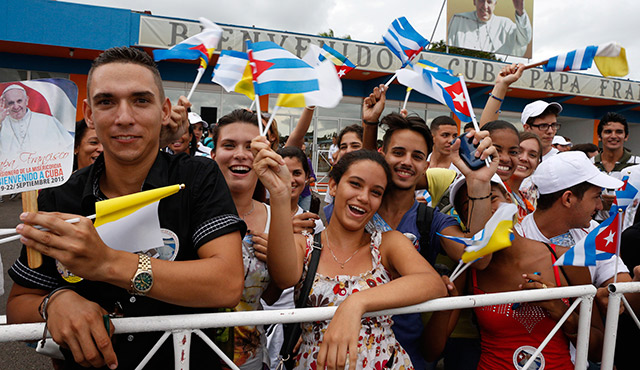HOLGUIN, Cuba (CNS) — A pope’s visit is always a blessing, but there is something special about this one, say some residents in the city of Holguin, Cuba’s fourth largest city, as they prepare not just for Pope Francis’ arrival to the island but also to their city.
Juan Pablo Aguilera Torralbas, who works for the Diocese of Holguin, said Pope Francis is a Latin American, is spontaneous, is simple, was born speaking the same language and, more or less, grew up with the same cultural cues as those in Cuba.
“That’s what makes him different,” Aguilera said. The pope and the people of Cuba “have a lot in common,” Aguilera added.
Though all popes are loved by Catholics in Cuba, there is a cultural bond with this one, said 24-year-old Aguilera, who was named after St. John Paul II.
Everyone has been busy, preparing, preparing, preparing, but Aguilera said he thinks there will be something much bigger that comes from this pope’s visit, something yet unknown, and that’s something that’s not easy to prepare for “psychologically,” he said.
Sister Taimi Buitrago Prieto, who will be preparing the sacristy the pope will use in Holguin, said Cubans sometimes create hope or expectations for changes in the political sphere, but the biggest blessing the people of Cuba can receive is self-transformation toward God, she said.
Aguilera said he has seen small but constant changes with each visit by a pope: more people participating in parish life, a bigger commitment to faith, learning more about a Christian’s role.
Cuba’s Catholic Church underwent a wave of openness following the 1998 visit of St. John Paul II. Then Pope Benedict XVI came in 2012 with more messages of salvation. And now comes Pope Francis as a “missionary of mercy.” With a third visit by a pontiff, it’s obvious, Aguilera said, that “God has his hand in Cuba.”
The pope was welcomed to Havana Sept. 19 by a military band and shouts of “Cristo Vive” (or “Christ lives”) and a lengthy discourse with political undertones by Cuban President Raul Castro, who said the pope’s writings on social themes about the environment and humanity “have motivated profound reflection” in him.
He also said that the “leader of the Cuban Revolution,” his brother Fidel, also had called in 1992, during a United Nations conference about the environment and development, for the necessity to save humanity from self-destruction, for better distribution of wealth and knowledge, of science and technology, of sustainable development and encouraged the disappearance of “hunger, not man.”
Raul Castro said the “current international system is unfair and immoral” because it has “globalized capital and converted money into an idol,” touching on major themes of Pope Francis’ papacy.
The pope referred to Cuba as this “beloved nation” visited by his predecessors and said Cuba, as an archipelago, is a “key” to various parts so “its natural vocation is to be a point of encounter for all people to engage in friendship,” he said.
Father Angel Andres Gonzalez, director of the office of communications for the Diocese of Holguin, gathered with others around a television set in Holguin, on the eastern end of the island, to watch the pope’s arrival in Havana. He said the pope has started his journey “with a focus, has set up (the frame of the door) through which he will walk” in Cuba.

